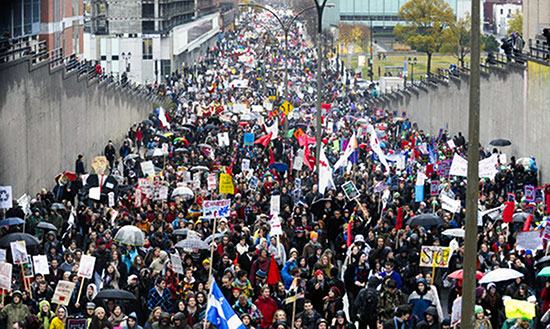200,000 in Quebec demand:
‘Education for ALL!’
By
Gene Clancy
Published Mar 7, 2012 10:21 PM
On March 1, as many as 200,000 students and their supporters poured into the streets in Montreal and other cities across Quebec to protest proposed tuition hikes by Quebec’s premier, Jean Charest.
University tuition fees in Quebec will increase starting in September to a final total of $1,625 over the next five years, a 75 percent jump by 2016-2017. So far, 80,000 university and college students have joined a provincewide general strike and their numbers continue to grow, driven in part by the support of almost half of Quebecers, according to recent public opinion polls. (Globe and Mail, March 1)
Police moved in with tear gas and truncheons to disperse the thousands of students protesting outside the provincial legislature in Quebec City.
Marie-Pierre Desilets, a third-year Universite Laval student, stated that sending out the riot police was an extreme measure. “I think the fact that they were shooting pepper spray when the students are just trying to walk towards the parliament, it’s kind of extreme,” she said. (CTV News, March 1)
Many students carried signs saying “Education for all!” and “Education must be accessible!” (CTV News)
The historically low tuition rates at universities in Quebec and throughout Canada are the result of decades of struggle starting in the 1960s to make higher education accessible to more than the wealthiest students. Most of the protesters view the proposed tuition hikes not only as a financial hardship, but as an attack on the social fabric of Canadian society.
Widening protests
For the past several weeks, Montreal has been alive with dramatic protests. Tens of thousands took to the streets in a major demonstration on Feb. 16 — the largest strike action to date — emptying the schools of students. “Qui sème la misère, récolte la colère!” echoed off buildings on St. Catherine Street in downtown Montreal, a popular rhyming French language slogan roughly translating to “Whoever sows misery harvests anger!” (rabble.ca., Feb. 28)
About 37 students were arrested two weeks ago when they occupied a junior college in Montreal, threw objects at police officers and briefly occupied the Jacques Cartier Bridge.
A symbolic red patch, representing the student movement in Quebec, is now common on city streets, pinned to winter jackets and backpacks. Even historical landmarks are connecting with the strike movement. The illuminated cross on Mount Royal, a Montreal landmark, was draped last week with a giant red cloth.
Key to the momentum of the current Quebec student strike is significant political support from community organizations and unions. The social movement collaboration is represented in the Coalition opposée à la tarification et à la privatisation des services publics [Coalition Against the Tariff and the Privatization of Public Services], a coalition that moved to blockade the Montreal stock exchange for several hours on Feb. 16.
On a sunny, winter morning, hundreds of protesters locked arms and formed a human chain across the doors to the Stock Exchange. It was a protest in support of the student struggle against tuition hikes but also against policy shifts toward the privatization of public health care, specifically the new obligatory health care fee for Quebec residents.
Responding to the blockade, police in riot gear used pepper spray and batons against protesters, mere steps away from the financial district park where Occupy Montreal was encamped last fall.
Demands driving the strike in Quebec are rooted in the struggle to ensure accessible education. As the Quebec student strike moves forward, however, students and other protesters in Montreal are taking steps not only against policies in Quebec, but are opposing capitalist politics in general. The student demonstrations have a potential to inspire a broader grassroots challenge to the austerity economics being unleashed by right-wing politicians across Canada.
Articles copyright 1995-2012 Workers World.
Verbatim copying and distribution of this entire article is permitted in any medium without royalty provided this notice is preserved.
Workers World, 55 W. 17 St., NY, NY 10011
Email:
[email protected]
Subscribe
[email protected]
Support independent news
DONATE


